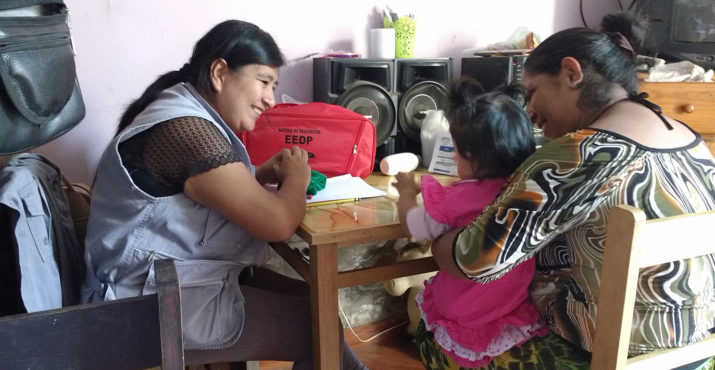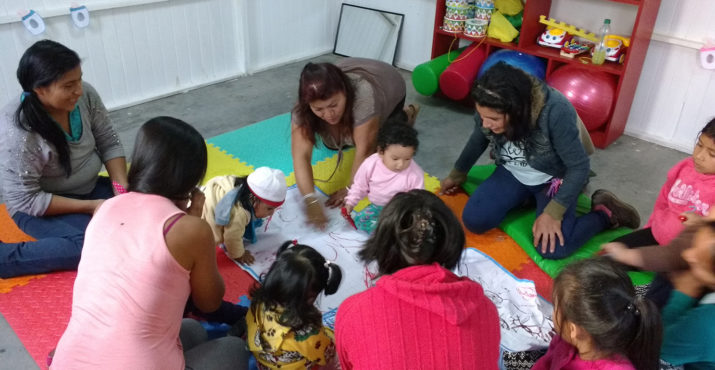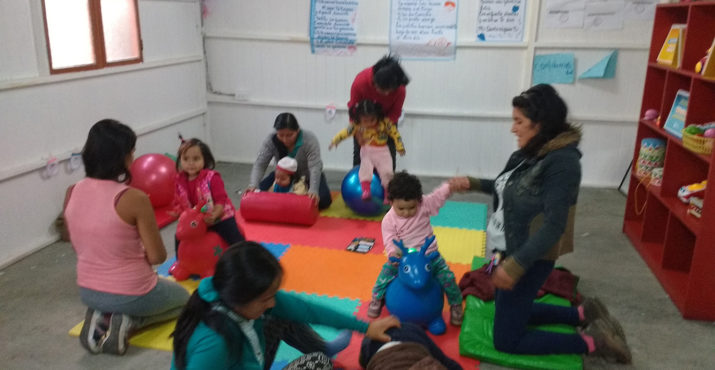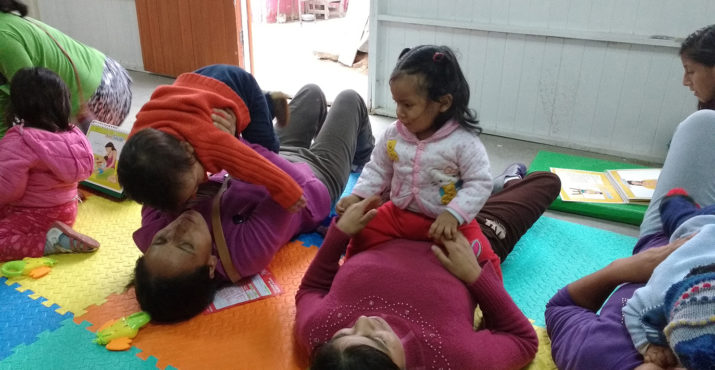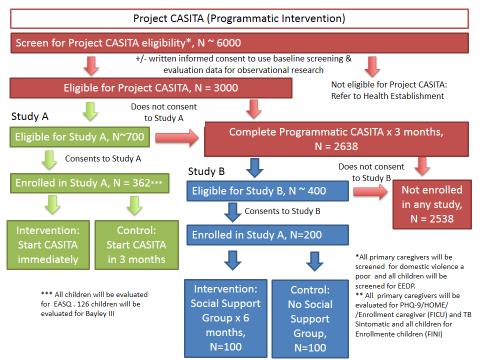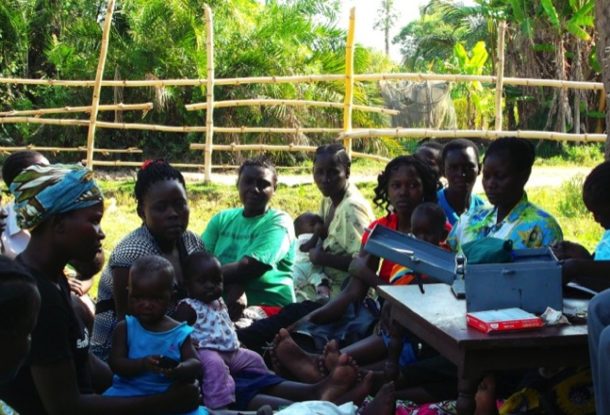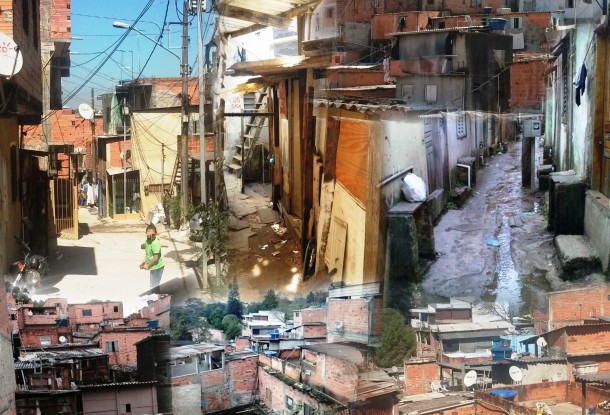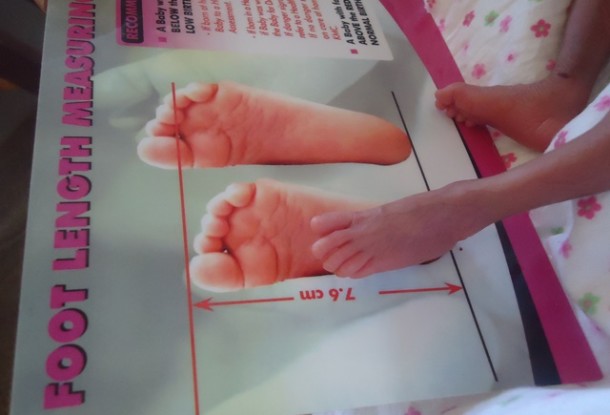Innovation Summary
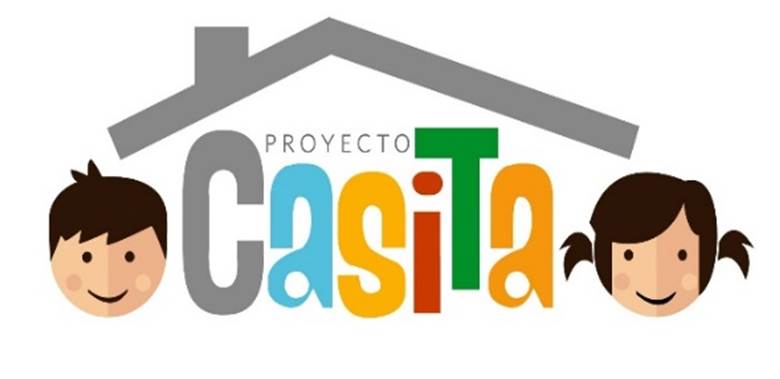
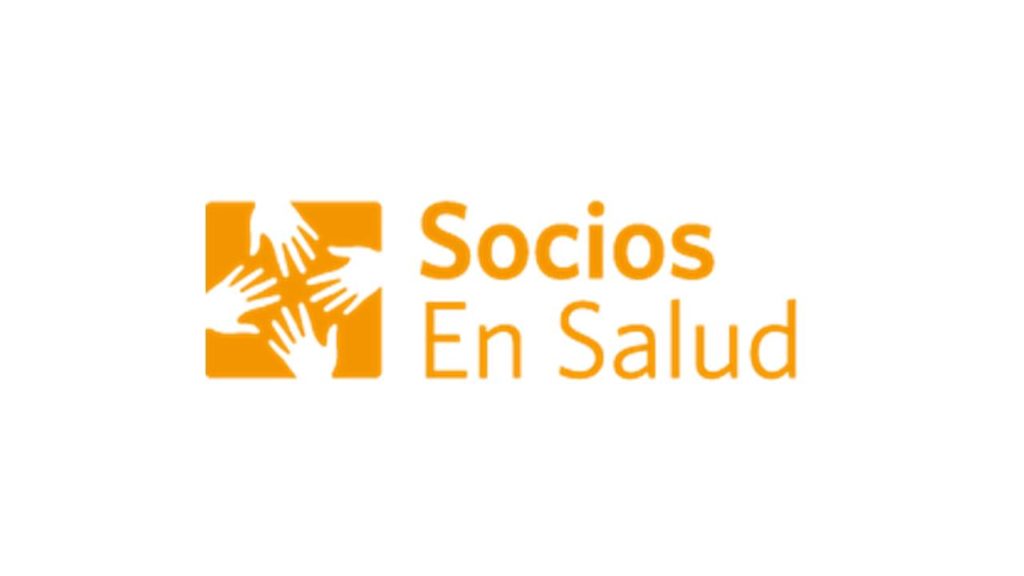 Socios En Salud Sucursal Peru seeks to transition to scale a culturally-specific, evidence-based early intervention (CASITA) delivered by community health workers (CHWs) in Lima, Peru. With support from Grand Challenges Canada (GCC), the CASITA intervention pilot successfully demonstrated that this low-cost, community-based strategy improves neurodevelopment among children ages 6-24 months. Proof of concept was also demonstrated by the enthusiastic endorsement from all stakeholders (trainers, CHWs, families, and healthcare providers) and their belief that this program can be realistically scaled up in Peru. Identified through the pilot, the core effective components of CASITA are: 1) high-quality training and supervision of CHWs, 2) structured community-based sessions to deliver evidence-based coaching on parenting behavior and child stimulation, and 3) validation of caregivers’ parenting efforts.
Socios En Salud Sucursal Peru seeks to transition to scale a culturally-specific, evidence-based early intervention (CASITA) delivered by community health workers (CHWs) in Lima, Peru. With support from Grand Challenges Canada (GCC), the CASITA intervention pilot successfully demonstrated that this low-cost, community-based strategy improves neurodevelopment among children ages 6-24 months. Proof of concept was also demonstrated by the enthusiastic endorsement from all stakeholders (trainers, CHWs, families, and healthcare providers) and their belief that this program can be realistically scaled up in Peru. Identified through the pilot, the core effective components of CASITA are: 1) high-quality training and supervision of CHWs, 2) structured community-based sessions to deliver evidence-based coaching on parenting behavior and child stimulation, and 3) validation of caregivers’ parenting efforts.
The three year transition-to-scale funding for CASITA will allow the team to provide a community-based early intervention and social support package to approximately 3000 caregivers with children that have neurodevelopmental delays across the Municipality of Carabayllo. CASITA intervention sessions will be provided at existing Casa Amiga community centers which offer specialized services for women afflicted by domestic violence (including mental health, legal support, and shelter), 10 “Casas de la Salud” and 9 Health Centers of Carabayllo.
Gallery
Impact
Expected Impact:
- 6000 caregiver/child (dyads will be screened
- 3000 caregiver/child (dyads) will be enrolled
- 3000 caregiver/child (dyads) will receive the CASITA early development intervention
- 100 caregivers will receive social support group sessions
- 40 health community workers will be trained
- 30 health community workers will deliver the CASITA intervention
“CASITA is a community-based intervention that has proven successful in improving early childhood development of children and families living in vulnerable conditions. With CASITA, we want to transform lives forever.”
-Leonid Lecca, Principal Investigator, CASITA
Innovation
The “CASITA Project” will reach 3000 dyads comprised of children ages 6 to 24 months of age who are at risk of developmental delay and their primary caregivers. All children and their caregivers will participate in a three-month community-based screening and treatment (“CASITA”) for neurodevelopmental delay. The program will be carried out in collaboration with multiple Peruvian public sector partners: Municipality of Carabayllo, Korea International Cooperation Agency (KOICA) and Partner In Health.
Nested Study A, entitled “CASITA Evaluation,” will comprise of 362, randomly selected dyads participating in the CASITA intervention. Dyads who consent to participate will be randomly assigned either to receive CASITA immediately or to a “wait list then treat” arm, in which CASITA is deferred for 3 months to allow these children to serve as a controls. The primary aim of this study is to understand whether a community-based early intervention (CASITA) is more effective than the standard of care in Peru for young children at risk of neurodevelopmental delay.
The hypothesis is that children receiving CASITA will experience greater changes in NDD (measured by Extended Ages and Stages Questionnaire (EASQ) at 3 months compared with baseline) when compared with changes among children in the control arm. As a secondary aim the project will compare 3-month endpoints using the Bayley III among intervention and control children ages 12 to 18 months.
Nested Study B, entitled “Social Support Group”, will comprise of 200 dyads in the intervention. Dyads in this nested study will be sequentially recruited from the primary caregivers who have completed the CASITA intervention and who meet additional Study B criteria. Mothers who consent to participate in Study B will be randomized to participate in 6 months of Social Support Groups versus no Social Support Group. The aim of this study is to understand whether mothers who participate in CASITA and the Social Support Group report better psychosocial well-being, compared to mothers who receive the CASITA intervention only.
Collaboration
Funders:
- Municipality of Carabayllo
- Ministry of Health (MINSA). We will work with RED de Salud Túpac Amaru and Microred Carabayllo.
- Partners In Health
- Korean International Cooperation Agency (KOICA)
- Saving Brains Partners
Key Partners:
- Socios En Salud Sucursal Peru
Implementation
Expected Drivers:
Multi-sector Partnership
Socios En Salud Sucursal Perú engages with the Peruvian Ministry of Health as well as civil, social, and community-based organizations to ensure projects are sustainable at the community and municipal level.
Mutual Health Priority Amongst Invested Partners
Recent trends in Latin America toward decentralization of health services have shifted resources and leadership from Ministry of Health programs to local municipalities. Municipalities, such as Carabayllo, have resources and infrastructure to implement health programs, yet lack necessary expertise to execute programs effectively. Responding to this mandate, Rafael Alvarez Espinoza, Mayor of Carabayllo, identified the impact of child labor and social inequality on NDDs.
As a result, he requested that Socios en Salud Sucursal Peru lend their expertise in community-based interventions to improve early neurodevelopment through a scalable, relatively low-cost program. Thus, this program represents a mutual health priority among invested partners [6].
Expected Challenges:
- Demonstrating the role of caregiver in the family and community, a model of change for future families living around them.
- Showing the role of the community worker in early child development at the community level.
Continuation
This project uses integrated innovation to grow and sustain impact for the foreseeable future through social, technological, and business strategies.
The team plans to scale CASITA through a smart business model that attracts long-term investment from public funds through an early child Center of Excellence (“Center”). The Center will be designed similarly to the SPARK Center at Boston Medical Center and will have access to best practice interventions, metrics and research infrastructure [1], and the expert local and international early neurodevelopment CASITA team.
The team’s vision for the Center is to create a point of reference for state-of-the art, community-based, early intervention in Peru. The Center will provide neurodevelopmental and nutritional support to children under 2 years old at developmental or social risk at no cost to users through the CASITA program and consulting, education, and training services through paid public contracts.
Evaluation Methods
Outcomes to be measured and evaluated:
- Changes in child development.
- Changes in parenting behavior.
- Child, caregiver, and household characteristics that predict who benefits most from the intervention.
The innovation will evaluate the impact of CASITA on HOME scores as well as developmental status as measured by Bayley’s. Approximately 35% of the Study A cohort will be aged 12 to 18 months at the time of Study A enrollment (thus 15 to 23 months at the time of Bayley administration). Based on estimates available in existing literature, the team anticipates that a sample size of 128 will be adequate to demonstrate the effect of CASITA using Bayley measurements.
References
- https://www.bmc.org/programs/spark-center
- Fernald, L., Karigera, P, Hidrobob, M., y Gertlera, P. gradientes socioeconómicos en el desarrollo infantil en niños muy pequeños: Evidencia de la India, Indonesia, Perú y Senegal. PNAS, 2012. 109 (2): p. 17.273 a 17.280.
- Schreiner, M., Progreso de Índice de Pobreza: Un Puntuación Pobreza simple para Perú. 2008, Fundación Grameen: St Louis, MO
- Caldwell, B. y R. Bradley, eds. Home Observation For Measurement of the Environment Administration Manual.tempe, AZ : Family y Human Dynamics Research Institute, Arizona State University.
- Totsika, V. y K. Sylva, La observación principal para la medición de Medio Ambiente Revisited. Child Adolesc Salud Ment, 2004. 9 (1): p. 25-35.
- Análisis situacional de salud de la Microred Carabayllo. 2015
Resources
-
Research
-
Community-Based Needs Assessment of Neurodevelopment, Caregiver, and Home Environment Factors in Young Children Affected by HIV in Lima, Peru.Muñoz M, Nelson A, Johnson M, Godoy N, Serrano E, Chagua E, Valdivia J, Santacruz J, Wong M, Kolevic L, Kammerer B, Vega C, Vibbert M, Lundy S, Shin S. J Int Assoc Provid AIDS Care. 2016 Feb 25. pii: 2325957416631625
-
CASITA: community-based family coaching to stimulate early child development in Lima, Perú.
Katrina Nelson*, Ann C. Miller*, Maribel Muñoz, Nancy Rumaldo, Betsy Kammerer, Martha Vibbert, Shannon Lundy, Guadalupe Soplapuco, Leonid Lecca, Alicia Condeso , Yesica Valdivia, Sidney Atwood, Sonya S. Shin
(In review, JAMA Pediatrics Review)
-
-
Multimedia
-
Instruments and Batteries
-
Extended Ages and Stages Questionnaire (EASQ). Physical (Fine/Gross motor), cognitive, language, psychoemotional (adapted from Ages and Stages Questionnaire (ASQ): Fernald, et al, Socioeconomic gradients in child development in very young children: Evidence from India, Indonesia, Peru and Senegal. PNAS. 109:2. October 16, 2012. [2]
-
Poverty Questionnaire [3]
-
HOME Observation for Measurement of the Environment. Quantity and quality of child care experiences, quality of parent/child interactions/ relationships, home, social and arterial resources, family well-being and stress (Caregiver mental health, chaos, instability), parent involvement, parent responsivity, cognitive stimulation, quality of parent-child interactions. [4,5]
-
Bayley Scales of Infant and Toddler Development (Bayley-III)
-
Evaluación del desarrollo psicomotor del niño de 0 a 3 años (EEDP)
-
Screening of Domestic Violence
-
Patient Health Questionnaire-9(PHQ-9)
-
Self-Reporting Questionnaire (SRQ)
-
Enrollment caregiver Questionnaire (FICU)
-
Enrollment children Questionnaire (FINI)
-
WHO-5 Wellbeing Index
-
Parenting Sense of Competence
-
